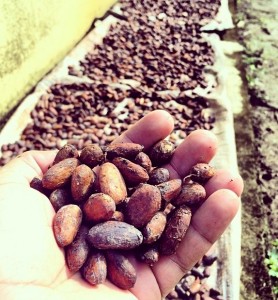 With an ever-growing interest in health, wellness, and particularly nutrition, there is more awareness regarding general nutritional guidelines which encourage more fruits and vegetables, choosing whole grains, cutting back on high-sodium foods, and reaching for water before sugary drinks. Much to the dismay of many Americans, unhealthy fats (trans, saturated) and sweets are generally discouraged. It is advised to keep these foods to a minimum, which can be even more difficult to adhere to around holidays. If you’re a chocolate lover, however, here is some good news that may make your day!
With an ever-growing interest in health, wellness, and particularly nutrition, there is more awareness regarding general nutritional guidelines which encourage more fruits and vegetables, choosing whole grains, cutting back on high-sodium foods, and reaching for water before sugary drinks. Much to the dismay of many Americans, unhealthy fats (trans, saturated) and sweets are generally discouraged. It is advised to keep these foods to a minimum, which can be even more difficult to adhere to around holidays. If you’re a chocolate lover, however, here is some good news that may make your day!
The Health Benefits of Cocoa
Dark chocolate, or cocoa, contains high concentrations of compounds called flavonoids. These compounds are naturally abundant in plant-based foods like fruits, vegetables, tea, coffee, and wine and promote several health benefits. Flavonoids are at the forefront of cardiovascular research; they have been associated with reduced risk of stroke and heart disease by decreasing blood pressure and improving blood vessel health. A review published in the American Heart Association’s journal Circulation presented epidemiological data from across the globe demonstrating beneficial effects of cocoa on blood pressure and vascular and platelet function as well as insulin resistance.
Now you may be wondering, “How exactly does cocoa work to lower my blood pressure, reduce my insulin resistance, and improve my overall heart health?”  Although the research remains somewhat inconclusive, a host of mechanisms through which cocoa may induce benefits on cardiovascular health have been proposed. It is believed that flavonoids activate a molecule known as nitric oxide (NO). NO induces relaxation of vascular smooth muscle, thus improving endothelial cell function and, consequently, blood pressure. In addition to the vasodilatory response stimulated by flavonoids, these plant-synthesized compounds, which belong to a family known as polyphenols, also exhibit antioxidant and anti-inflammatory properties. Given the fact that high blood pressure and insulin resistance are risk factors for type 2 diabetes mellitus, which is a risk factor itself for cardiovascular disease, the benefits of cocoa consumption are far reaching. Although several studies have shown that cocoa effectively lowers both blood pressure and LDL (“bad”) cholesterol levels, the appropriate dosage necessary to achieve these cardioprotective effects has not yet been determined.
Although the research remains somewhat inconclusive, a host of mechanisms through which cocoa may induce benefits on cardiovascular health have been proposed. It is believed that flavonoids activate a molecule known as nitric oxide (NO). NO induces relaxation of vascular smooth muscle, thus improving endothelial cell function and, consequently, blood pressure. In addition to the vasodilatory response stimulated by flavonoids, these plant-synthesized compounds, which belong to a family known as polyphenols, also exhibit antioxidant and anti-inflammatory properties. Given the fact that high blood pressure and insulin resistance are risk factors for type 2 diabetes mellitus, which is a risk factor itself for cardiovascular disease, the benefits of cocoa consumption are far reaching. Although several studies have shown that cocoa effectively lowers both blood pressure and LDL (“bad”) cholesterol levels, the appropriate dosage necessary to achieve these cardioprotective effects has not yet been determined.
Other proposed health benefits of cocoa and dark chocolate are highlighted by researchers from the cocoa research center at the University of the West Indies in Trinidad and Tobago. Cocoa is reportedly one of the richest sources of magnesium, a micronutrient that is essential for cognitive health and healthy heart function. Cocoa plant seeds also contain a high amount of copper , a trace mineral that plays a vital role in red blood cell formation, immunity, proper nerve function, and bone health.
Why is it that dark chocolate makes us feel good? In addition to its high nutritional value, cocoa contains a chemical compound called phenylethylamine that mimics the effect endorphins have on the human brain. This compound, like endorphin, induces anti-depressant and euphoric feelings of happiness and contentment. Moreover, the amino acid tryptophan is naturally found in cocoa, which is thought to help alleviate stress and improve mood as well as sleep quality.
How to Maximize the Health Benefits of Cocoa
When looking for cocoa products, the general rule is: the higher the cocoa content and the less processed the cocoa is, the more nutrients and antioxidants it contains and usually less sugar. For example, chocolate with 72% cacao (cacao is the dried seeds used to make chocolate and cocoa) has more health benefits than chocolate with 60% cacao. In fact, cocoa in its raw form contains as much as four times the antioxidants as processed cocoa! Minimally processed cocoa powder is available at most health foods stores; it will taste bitter, mind you, but a touch of sugar or honey will sweeten it without detracting significantly from its nutritional punch. In traditional grocery stores look for dark cocoa powder.
 Interested in adding cocoa into your diet? Don’t feel as though you need to deprive yourself of all of those sweets and treats you crave. Instead just remember that moderation is key! You can add cocoa powder to more than just dessert foods including yogurt, coffee, and more! Chocolate in general contains saturated fat and sugar, so look for cocoa products that are lower in these to prepare your next cup of cocoa. Be sure to try this healthy hot cocoa recipe so that while the weather outside here in Philadelphia is frightful, you can cozy up with a mug of hot cocoa to make your day (and your heart) more delightful. Unfortunately, cocoa and chocolate prices are soaring so get yours today!
Interested in adding cocoa into your diet? Don’t feel as though you need to deprive yourself of all of those sweets and treats you crave. Instead just remember that moderation is key! You can add cocoa powder to more than just dessert foods including yogurt, coffee, and more! Chocolate in general contains saturated fat and sugar, so look for cocoa products that are lower in these to prepare your next cup of cocoa. Be sure to try this healthy hot cocoa recipe so that while the weather outside here in Philadelphia is frightful, you can cozy up with a mug of hot cocoa to make your day (and your heart) more delightful. Unfortunately, cocoa and chocolate prices are soaring so get yours today!
Cheers,
Dorothy Hanrahan, BS, BA
Eat Fit Health, Intern
MS Candidate Human Nutrition, 2014, Drexel University
One of my favorite chocolate brands is Grenada Chocolate which I order online. Their line is gluten free, dairy free, nut free, organic and delicious!